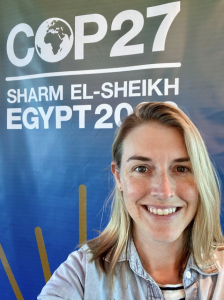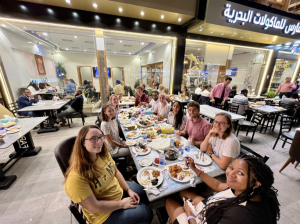ESA & COP27: RINGO: A researcher’s guide to COP27

Day 1 of COP27
by Morgan Rogers
There I was— my first time in Egypt and my first time attending the Convention of the Parties (COP), on a bus hurtling through Sharm El Sheik towards the convention center. Around me sat fellow researchers, diplomats, heads of NGOs, activists, and everyone else you could imagine attending an event like COP27.
Crowds stepped off the various buses, lined up, and slowly filtered into the convention center, which was prepared to host approximately 35,000 attendees. As an urban planning and urban ecology PhD student, my plan was to attend talks and negotiations related to urban issues with a focus on adaptation planning. However, as soon as I walked through the convention doors, I was struck with the enormity of the event, and the endless possibilities my week there could hold. Luckily, Dr. Gillian Bowser, a fellow ESA member, had recommended starting off each day with the morning RINGO meeting.
For the uninitiated, RINGO is an official constituency recognized by the UN Framework Convention on Climate Change (UNFCC) and stands for Research and Independent Non-Governmental Organizations. Connecting with RINGO absolutely made my experience at COP27! There are 9 official constituencies, representing different sectors of civil society that are given time to present their thoughts to the official negotiators who are building policy at COP. RINGO’s goal is to provide negotiations with the latest science on whatever issue they are negotiating, not necessarily to advocate for a particular solution.

COP27 attendees walking to different areas of the convention center to attend talks and negotiations
Every morning I went to their briefing meeting, which started with presentations on the various themes of the negotiations such as adaptation, mitigation, loss and damage, etc. The briefing was a very helpful overview to understand how negotiations were progressing. Then they would open the floor up to members to share their insights, experiences, and any announcements about upcoming events that day. Finally, they would break up the room into affinity groups so members could share information and collaborate on their topic of interest at COP27. I found these meetings incredibly helpful in contextualizing and recapping the huge number of happenings each day, and recommend ESA members attending future COPs make this a part of their daily schedule. It was also a great way to trade information and add anything to your schedule that you might have missed.
The affinity group meetings were also really wonderful, and allowed me to truly get to know other researchers on a more personal level. I attended the affinity group for early career RINGOs, organized by Dr. Bowser and Dr. Jessica Hellman and I am forever grateful to them because this group greatly enriched my experience at COP. We had regular meet ups throughout the conference, including sharing dinner in Old Town at a fish market and a number of other social gatherings. It was during these meetups that we shared tips on getting the most out of COP, explored Sharm El Sheik, and discussed the ways in which we could bring our insights from COP into our own work, specifically how we could work with other disciplines and translate our research into actionable policy.

Dinner in Old Town with the Early Career Researchers RINGO affinity group
One day in particular, Science Day, was highly relevant for researchers and spoke to the conversations we were already having during our RINGO meetups. The host country, in this case Egypt, organizes the conference around a series of themed days to help facilitate dialogue among key stakeholders on particular issues critical to climate action. Science Day is one of these themed days, which brings together the IPCC, UNEP and other institutions to share their latest findings and to provide space for stakeholders to engage with the science community. The main message from the speakers was for researchers to take an interdisciplinary approach to sustainability research and to translate that research into actionable policy.
I was heartened by this message as I found that my experience with RINGO and with my affinity group exemplified this idea. During our meetings we regularly discussed the ways in which we could translate research into policy and the importance of working together across disciplines. An often shared opinion among the group was that an interdisciplinary approach to sustainability science is critical due to the multifaceted nature of challenges related to sustainability and climate change. Many of us walked away, if not with a potential collaborator from a different discipline, a contact to reach out to for a future project or for insight.
For those of you interested in attending COP28 this year, I highly encourage you to attend morning RINGO meetings. I cannot stress enough how much RINGO enhanced my experience of COP and gave me a meaningful avenue to engage with the negotiations. Thank you to RINGO for helping to make my COP experience such a great one, and to ESA for having me attend and share my story.